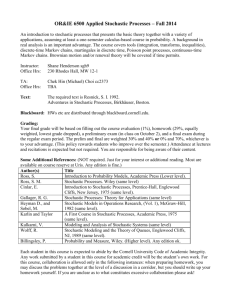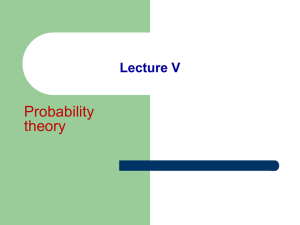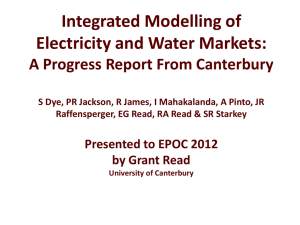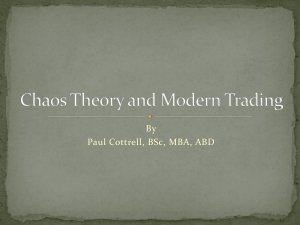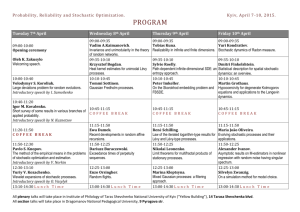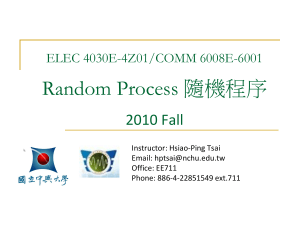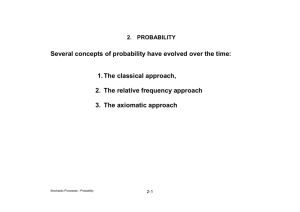STOCHASTIC PROCESSES - ANALYSIS AND PROCESSING
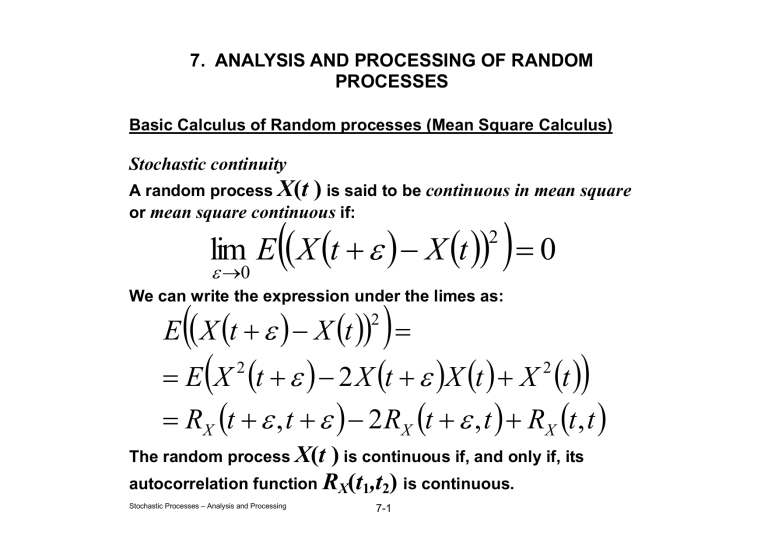
7. ANALYSIS AND PROCESSING OF RANDOM
PROCESSES
Basic Calculus of Random processes (Mean Square Calculus)
Stochastic continuity
A random process
X(t )
is said to be continuous in mean square or mean square continuous if:
lim
0
E
X
t
X
2
0
We can write the expression under the limes as:
E
E
X
R
X
X
t
t
2
t
, t
X
2
X
2
2
t
R
X
t
, t
X
2
R
X
The random process
X(t )
is continuous if, and only if, its autocorrelation function
R
X
(t
1
,t
2
) is continuous.
Stochastic Processes – Analysis and Processing
7-1
Note: The mean square continuity of does not imply that the sample functions of are continuous, e.g. Poisson process is mean square continuous, but sample functions of the Poisson process have a countably infinite number of discontinuities.
For the Poisson process X(t ) with the rate
> 0 , we have:
E
X
t
X
2
2
0
0
Stochastic Processes – Analysis and Processing
7-2
If
X (t )
is WSS process, then it is mean square continuous only, and only if, its autocorrelation function
R
X
( continuous for
= 0
.
) is
For WSS process we can write the previous expression as:
E
X
R
X
2 R
X
t
t
2
( t
R
X
X
)
2
2 R
X
t
t
R
X
lim
0
E
X
t
X
2
lim
0
R
X
R x
0
Stochastic Processes – Analysis and Processing
7-3
If
X (t )
is a mean square continuous process, then its mean is also continuous (but not mean square continuous):
lim
0
X
( t
)
X
( t ) which can be written as
lim
0
E
X
t
E
lim
)
X
t
Stochastic Processes – Analysis and Processing
7-4
Stochastic derivatives
The random process
X (t )
has a mean square derivative X
(t )
if l
.
i .
m
0
X
t
X
X
( t ) where l.i.m
denotes limit in the mean (square), that is
lim
0
E
X
t
X
X
( t )
2
0
Stochastic Processes – Analysis and Processing
7-5
The mean and the autocorrelation function of
X
(t )
are given by:
E
X
d dt
E
X
X
R
X
t
1 t
2
E
X
1 2
2
R
X
1
t
1
t
2
2
Stochastic Processes – Analysis and Processing
7-6
Stochastic integrals
A mean square integral of a random process
X (t )
is defined by:
Y t
1
X
d
t
0
l .
t i i .
m
0 where t
0
t
1
Stochastic Processes – Analysis and Processing
t and
t i
7-7
i
X
i
t i
t i
1
t i
t
t
0
X
d
R
Y
t
1
, t
2
E
t
t
1
0
X
d
t
2
X
d
t
0
0 t t
1 2 t t
0
E
X
d
d
7-8 Stochastic Processes – Analysis and Processing
0 t t
1 2 t t
0
R
X
,
d
d
Power spectral densities
The power spectral density (or just power spectrum
)
S
X
(
) of a continuous time random process
X(t )
is defined as the
Fourier transform of
R
X
(
)
:
S
X
R
X
e
j
d
R
X
1
2
S
X
e
j
d
These two relations are known as the Wiener-Khinchin relations .
Stochastic Processes – Analysis and Processing
7-9
White Noise
A continuous time white noise process
W(t )
is a WSS zeromean random process, with the autocorrelation function given by:
R
W
2
( t )
The power spectrum of the white noise is obtained to be:
S
W
2
e
j
d
2
Stochastic Processes – Analysis and Processing
7-10
Response of a Continuous Time Linear Time-Invariant (CT LTI)
System to Random Inputs
X(t )
CT LTI
System
Y(t )
If input to the system
X(t )
is a random process,, then the output
Y(t )
will also be a random process, given by:
Y
h
t
d
Stochastic Processes – Analysis and Processing
7-11
Also:
R
Y t
1
,
2
E
Y
h
E
X
t
d
h
X t
1
, t
2
d
d
If the input
X(t )
is WSS process, then:
E Y t
X
h
d
X
H
h
e
j
t dt
R
Y
h
X
d
d
Stochastic Processes – Analysis and Processing
7-12
The power spectrum of
Y(t )
is given by:
S
Y
R
Y
e
j
d
H
2
S
X
When the autocorrelation function of the output
R
Y
(
)
is required, than it is easier to obtain it from the power spectrum
S
Y
(
)
:
R
Y
2
1
S
Y
e
j
d
H
2
S
X
e
j
d
Stochastic Processes – Analysis and Processing
7-13
30
Stochastic Periodicity
A continuous time random process
X(t )
is mean square periodic , with period
T
, if
E
X
t
T
X
2
0
If
X(t )
is WSS, then
X(t )
is mean square periodic if, and only if, its autocorrelation function is periodic with period
T
:
R
X
T
R
X
Stochastic Processes – Analysis and Processing
7-14

